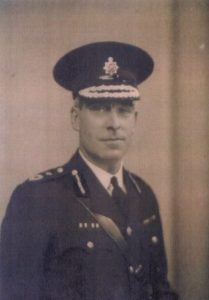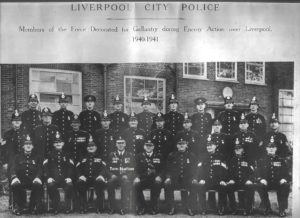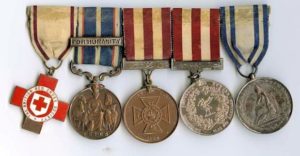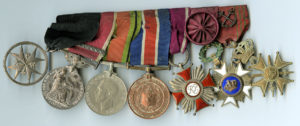THOMAS SKELTON MBE by alan leitch
Thomas Morton Skelton was born (1898) in Liverpool, where he was educated at the Liverpool Nautical Collage and Liverpool University where he studied Jurisprudence. (The study of law and the principles on which law is based).
He joined Liverpool Police on the 29th October 1920 where he served as Constable 337E stationed at Westminster Road Bridewell.
In 1929 he was awarded the bronze medal and vote of thanks from the Liverpool Shipwreck and Humane Society for stopping a runaway horse in Sandon Dock.
In 1931 he was promoted to Sergeant then in 1934 promoted to Divisional Inspector. In 1941 he was to receive three other awards for bravery, February he was awarded the order of the British Empire (civil division) in recognition of his very courageous conduct in effecting the rescue of a number of persons buried under the debris of homes destroyed during enemy attack, in May he was awarded the Belgian Croix de Guerre for removing high explosives from a Belgian ship which had been set on fire by incendiary bombs dropped by enemy aircraft, then in October he received the bar to the British Empire medal for conspicuous act of heroism in the rescue of men from a ship berthed in Gladstone Dock which had been severely damaged by a parachute mine, again in the same month he was awarded the Silver General Medal and vote of thanks from the Liverpool Shipwreck and Humane Society for stopping a runaway horse and wagon in No 2 Alexander Dock. In December of that year he also received the Liverpool Shipwreck and Humane Society Silver and bronze medal with Certificate of efficient performance of duty in effecting the rescue of a man who had fallen of a ship into Canada Dock, he then was also commended four times by the Liverpool Watch Committee and three times by HM Customs.
During this time apart from his normal police duties he was responsible for conducting police prosecutions in the magistrates Court, and won commendation for his sound knowledge of the law and his ability to apply it with intelligence and tact.
E division in which he was Divisional Inspector consisted at the time of a residentional and industrial area and dock land with a area population of over 200,000 and was policed by forty Sergeants, three hundred and seventy five Constables, two hundred Special Constables and one hundred War Reserve Constables, also in E Division where sixty fully manned Civil Defence Posts plus two report and Command Centres with a personnel of over one thousand two hundred.
He was appointed Chief Constable of Hyde Borough Police, Manchester aged 45yrs on the 1st April 1943. During his two years as Chief Constable he received the Silver meritorious Service medal and framed Certificate from the RSPCA (this is the highest decoration that the society can bestow) for his devoted service to animal welfare in effecting the rescue of a number of cattle from a ship which was severely damaged by enemy fire whilst he was an Inspector with Liverpool Police.
During this time he also received from King GeorgeV1 the Honour of being a serving brother of the Order of St John of Jerusalem.
In January 1945 he was seconded to the Allied Control Commission Germany to help reorganise the German Police as members of the police had been asked to volunteer at the outbreak of WW11 to act as a Task Force known as Einsatzgruppen with the special charge of executing Jews and other targeted groups, quite a number of these men had managed to slip back into the German Police after the war. Part of the Allied Control Commission’s assignment was to bring these men to trial, in all one thousand men where arrested but only three hundred and seventy where charged with any offence.
In 1950 he applied for and took up a position as Commissioner of police in Kingstown Jamaica where he was too remain for several years returning to the UK in January 1957. On his return he took a six months break but could not settle and took a job with Leaver Brothers as a Security Consultant. In February 1962 he was admitted to Bootle General Hospital where he passed away. He was 59 years old leaving a wife and daughter.
As for his Medals he left them to my brother who donated them to Liverpool Police. They are now on display in Greater Manchester Police Museum after being fully restored.
Alan Leitch
January 2013





